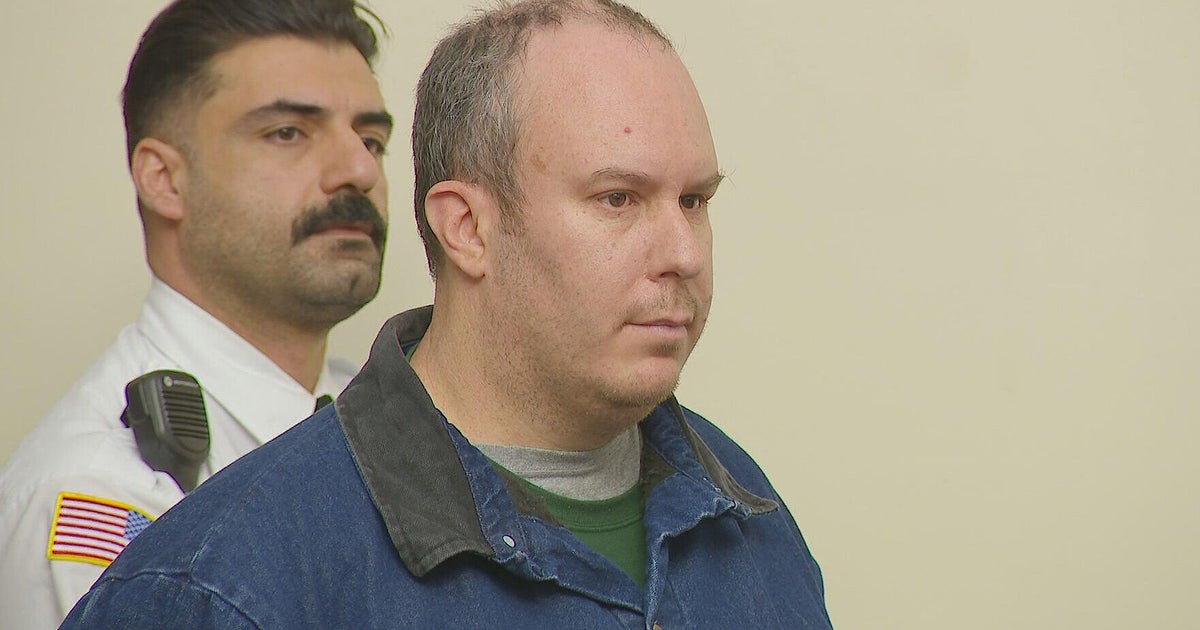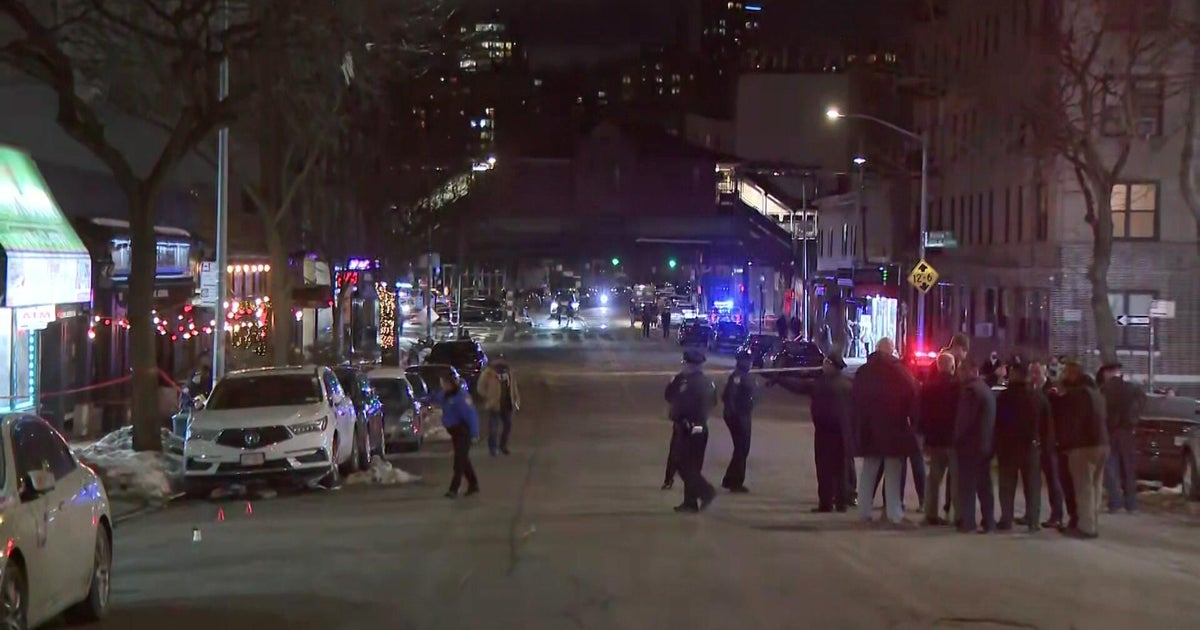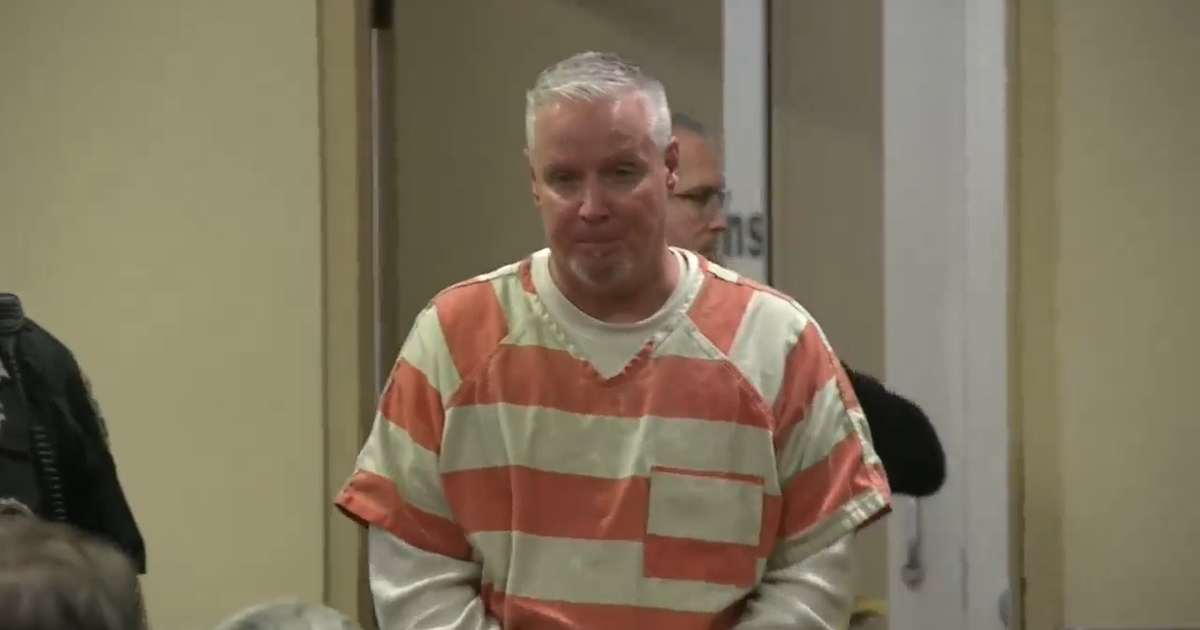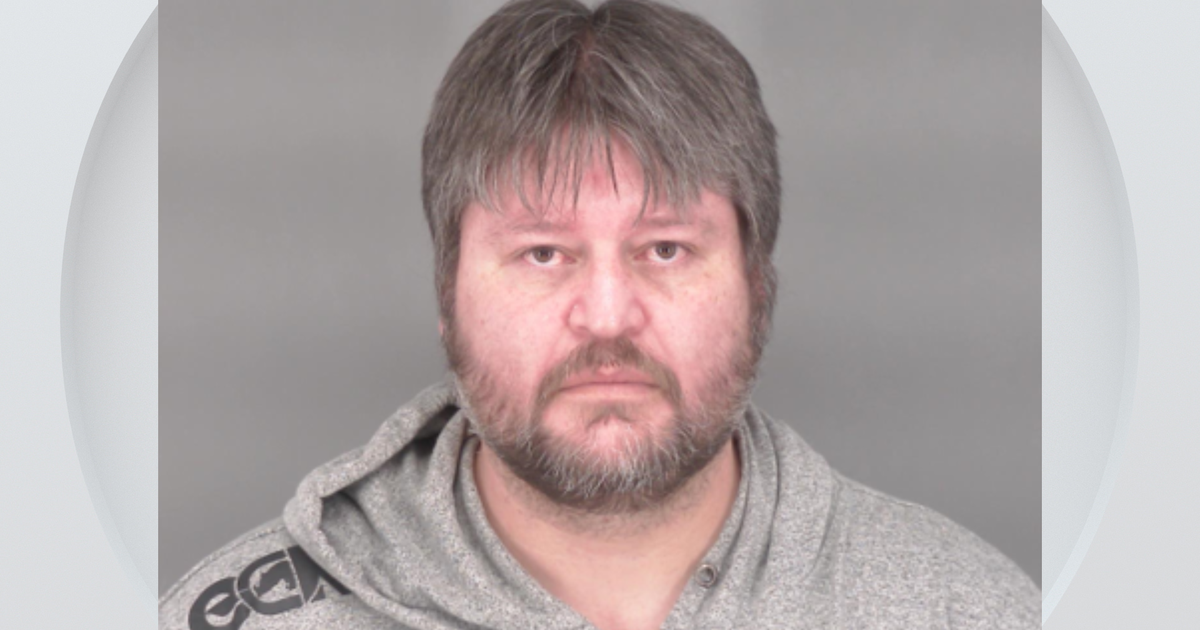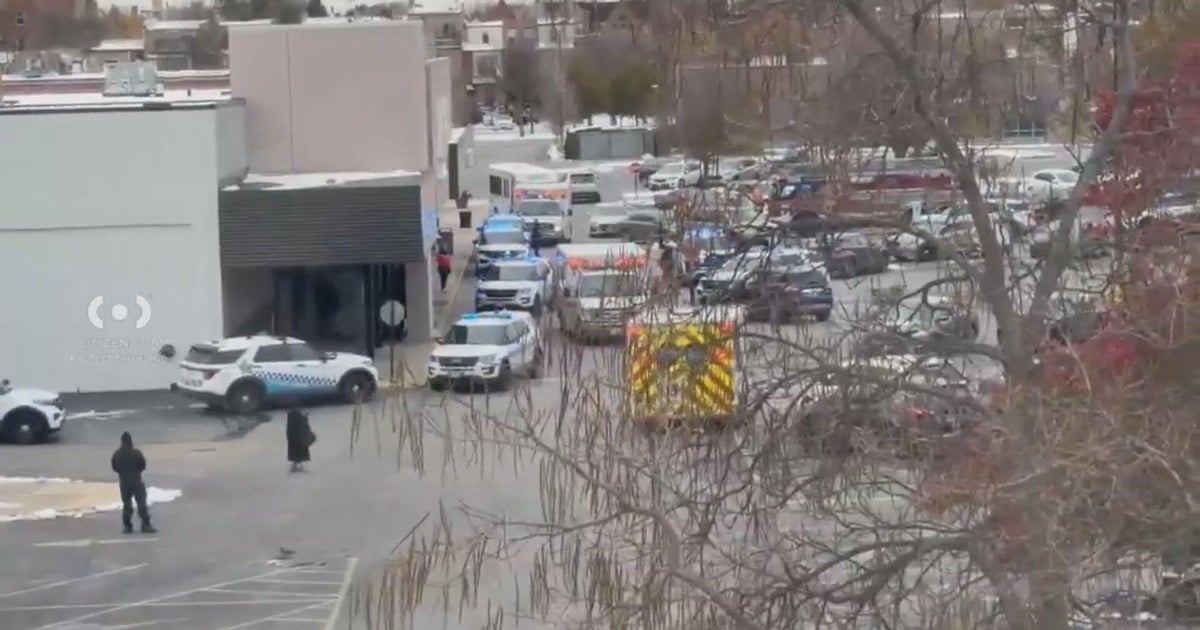Kim Potter Trial, Dec. 8: New Body Cam Footage Played In Court; Daunte Wright's Mother Testifies
This post is from Dec. 8, click here for latest updates from Dec. 9.
MINNEAPOLIS (WCCO) -- Opening statements were made Wednesday in the trial of former Brooklyn Center police officer Kim Potter, who is charged with first- and second-degree manslaughter in the shooting death of Daunte Wright. New footage of the fatal shooting was played in court when witnesses were called to the stand, the first of which was Wright's mother, who testified that the day her son died was the worst day of her life.
Katie Bryant shed tears on the stand as she described how her 20-year-old son was a "jokester" and a "wonderful father" to a 1-year-old child. She said that on April 11, she was watching her grandson when Wright stopped by their home to pick up cash for a car wash and gas. It would prove to be the last time she saw her son alive.
Body camera video presented in court showed Bryant arrive at the scene of the shooting, asking officers why Wright was shot. She testified that she could tell her son's body was under a sheet near his car because she recognized his tennis shoes.
"I wanted to comfort my baby," she said. "I wanted to hold him. I wanted to protect him, because that's what mothers do."
The second person to take the stand during the first day of testimony was Brooklyn Center police officer Anthony Luckey. The 31-year-old Brooklyn Center native was undergoing field training officer, and Potter was his partner.
Composite video of dash camera and body camera footage played during Luckey's testimony. The video showed the officer stopping Wright's car, Luckey running a check on Wright and attempting to arrest him on an outstanding misdemeanor weapons warrant. When Luckey tried to handcuff Wright, he said he could feel Wright tense up. "Don't do it, bro," Luckey can be heard saying.
When Wright tries to get back into his car and a struggle ensues, Potter can be heard saying "I'm going to Tase you." She threatens to Tase Wright again before yelling, "Taser, Taser." A moment later, a single shot rings out.
Immediately after, Potter says, "I just shot him...I grabbed the wrong f------ gun." The footage shows her crying, kneeling on the ground and screaming, "Oh my God." At one point, Potter says, "I'm going to go to prison," at which Luckey responds, "No, you're not."
Earlier in the day, during opening statements, prosecutors told the jury that police officers must always be mindful of the welfare of others. Attorney Erin Eldridge said that Kim Potter's duty that day was to protect life, not take it.
"This case is about an officer who failed," she said.
The prosecution's argument will not hinge on whether Potter intended to kill Wright, but that she was reckless and negligent. The state plans to argue that Potter should not have even tried to Tase Wright, as it's against the department's policy to Tase a fleeing suspect.
On the other hand, Potter's defense said in opening statements that her "good name has been besmirched" by false allegations and "slanted" press coverage. Defense attorney Paul Engh told the jury that all Wright had to do was surrender and he would "still be with us."
"[Potter] made a mistake," Engh said. "This was an accident. She's a human being. "
The defense plans to have Potter take the stand. Also testifying will be a police psychologist, who will speak on the concept of "action error," when someone does on thing while meaning to do another.
Others expected to testify in the coming days include the woman who was in the car with Wright when the shooting happened and Potter's former boss, Tim Gannon, who was fired as police chief in the days after Wright's death.
In the end, it'll be up to the jury to decide whether Potter's mistake was criminal or not.
Outside the courtroom Wednesday evening, protesters took to the streets of downtown Minneapolis, demanding justice for Wright. Courtney Ross, George Floyd's girlfriend, spoke to the crowd, saying that Potter needs to face consequences for taking Wright's life.
"If she was a woman of honor, she would have admitted her guilt and faced the consequences," Ross said. "But she's not. She's a coward. She's a murderer."
Testimony in the trial is set to continue Thursday morning. CBSN Minnesota will have gavel-to-gavel coverage.
Below are updates from earlier in the day:
------
UPDATE (4:54 p.m.): After the afternoon break, Officer Anthony Luckey continued his testimony, and body camera footage of the Daunte Wright shooting was played in court.
Prosecutors entered a number of videos into evidence that showed multiple perspectives on the initial traffic stop, the attempted arrest and the fatal shooting. In the videos, Kim Potter, who was Luckey's training officer, can be heard saying, "I'm going to Tase you," after Wright appears to resist arrest and get back into his car.
Potter says "Taser, Taser" before a gunshot is fired. Immediately after, Potter says "I just shot him...I grabbed the wrong f------ gun." She begins crying and kneels on the ground.
At one point, Potter says she's "going to go to prison," the video shows. Luckey can be heard telling her, "No, you're not."
During cross-examination, defense attorney Paul Engh led Luckey through what he would have been thinking during the stop in what the officer described as a "high-crime" area of the city. When asked if Wright ever stopped resisting him when he tried to arrest him, Luckey said, "No."
UPDATE (3:10 p.m.): The second witness on the stand for the prosecution is Officer Anthony Luckey, who was training with Potter during the fatal incident. The pool reporter noted that he appeared to not make eye contact with Potter while entering.
The prosecution began asking for Luckey to go into his background as an officer; he remains employed as a Brooklyn Center officer. Luckey said he wanted to be a police officer since he was 7 years old, and went to the "Police Explorer" program at the Brooklyn Center PD as a youth. He said he saw Kim Potter at times.
He said that training on the new Taser happened in March of this year, the month before Wright was shot. A new type of Taser was introduced by the department after he started.
Luckey was also asked by the prosecution to describe the day that Wright was killed. He says that he pulled the vehicle over after seeing the vehicle turn left after using a right blinker. Only after pulling over the vehicle did he note the expired tabs and the air freshener hanging from the mirror. He said that having an air freshener hanging in one's car is a common violation of the law in Minnesota.
Luckey said that he observed "marijuana residue" everywhere inside the car, clarifying that referred to "leaves" scattered around. He testified that Wright handed an insurance card to him, but it was out of date and didn't have his name on it. Luckey says he asked him to keep looking for the insurance and went back to his squad to run a check on his name. He said Wright was respectful during the interaction.
Luckey learned, upon running Wright's name, that he had a warrant for a weapons charge as well as a protection order against him. He said it didn't appear the woman with him in the vehicle was under any kind of duress.
At about 3 p.m., Judge Chu called for a 20-minute afternoon break.
UPDATE (2:06 p.m.): Daunte Wright's mother, Katie Ann Bryant, was called as the state's first witness during testimony. When being questioned by prosecutors, she described in detail the day her son was fatally shot.
Bryant, 43, testified that she and her husband had given Wright a car, a Buick, a few weeks before the shooting. The car had belonged to Wright's older half-brother and the family was working on getting the vehicle under their insurance. During cross examination, Bryant testified that she knew her 20-year-old son had never gotten his driver's license.
The day of the shooting, Bryant said Wright stopped by the house to get money for gas and a carwash. At the time, Bryant was watching Wright's 1-year-old son, Daunte Jr. It was the last time she'd see Wright alive.
Later in the day, she testified that she got a call from Wright, saying he'd been pulled over for having an air freshener on the rear-view mirror. Bryant told her son to hand the phone to police so she could explain the insurance situation.
"He sounded nervous, scared," Bryant said. "But I reassured him that it would be OK."
Bryant said she heard a police officer ask Wright to get out of the car. She testified that she heard the phone get put down and someone say, "Don't run." The called ended.
Bryant immediately tried to call back several times, and Wright's girlfriend, who was in the car, answered the FaceTime call. She said that police had shot Wright.
"She faced the phone toward the driver's seat," Bryant said. "My son was laying there. He was unresponsive. He looked dead."
Bryant testified that she called her husband and told him what happened. After, she called 911, trying to figure out where the shooting happened.
Bryant said a neighbor brought her and her grandson to the scene of the shooting. Bryant ran out of the car, ducked under the yellow police tape, and went to her son's car. She saw her son's body on the ground with a sheet over his body.
"I was so distraught I didn't know what was happening," Bryant said. "I didn't want to believe it was him, but I could tell it was him, because of his tennis shoes."
Body camera video was shown in court, showing Bryant arrive at the scene asking officers why Wright was shot.
"You guys made her hang up Facebook Live so you could kill my son, that's pretty pathetic," Bryant told the officers at the scene.
On the stand, Bryant said that was the worst day of her life. She said that she bit the insides of her cheeks thinking that would wake her up from what must have been a nightmare.
Bryant said she stayed at the scene for hours, explaining that she didn't want to leave until Wright's body was taken from the scene.
"I wanted to comfort my baby," she said. "I wanted to hold him. I wanted to protect him, because that's what mothers do."
UPDATE (11:50 a.m.): The defense begins its opening statements with attorney Paul Engh. Engh said that Potter told Wright "I'll tase you " and that "all Wright had to do was surrender."
Engh said that if Wright had driven away, he would have seriously hurt or killed another officer who was on the other side of the car.
"All Wright had to do was stop and he'd be with us," Engh said.
Engh said Potter couldn't let Wright leave because he was going to kill her partner.
Engh said that Potter yelling "Taser" three times shows she didn't have awareness she was holding a gun.
The defense also went over the list of witnesses it will bring to the stand during the trial. First up: Tim Gannon, Brooklyn Center's former police chief.
Gannon publicly called the shooting an "accidental discharge" after it happened. Both Potter and Gannon resigned shortly after the shooting.
Engh ended opening statements by saying that Potter's "good name has been besmirched" by allegations that are not true, and by press coverage "which has been slanted" and that the defense will reclaim it.
Court breaks for lunch.
UPDATE (10:30 a.m.): Prosecution began opening statements in the Kim Potter trial Wednesday morning, with the attorney Erin Eldridge saying a police officer must be "constantly mindful of the welfare of others."
Eldridge says a police officer's duty is to protect life, not take it.
"This case is about an officer who failed," Eldridge said.
Prosecution plays video clip of the shooting from Potter's body camera. After, Potter said "I grabbed the wrong f------ gun and I shot him. I'm going to prison and I killed a boy." Potter is clearly upset following the shooting.
"There's no do-over when you walk the streets with a loaded firearm," Eldridge said.
Eldridge says prosecution will not be arguing that it was Potter's intention to kill Wright, but that the shooting death was reckless and negligent.
Eldridge said that a use-of-force expert will say even using a Taser in the situation was unreasonable. Prosecutor said according to Brooklyn Center police policy, a fleeing suspect is not a reason to use a Taser. She's already gone over with the jury that Wright wasn't violent or threatening the officers.
Prosecution notes that the manner of death is homicide and the immediate cause of death being a gunshot wound of the chest.
UPDATE (10:15 a.m.): Before opening statements begin, the jury is brought into the court and is sworn in. Judge Regina Chu tells the jurors that Potter is to be considered innocent unless proven guilty beyond a reasonable doubt.
The jury is told not to discuss the case outside the courtroom -- even among themselves.
The jury consists of 14 people — including two alternates. Nine of the 12 jurors likely to deliberate are white, one is Black and two are Asian. The two alternates are white.
UPDATE (9:45 a.m.): After a 45-minute delay, court proceedings begin with Chu saying she has made rulings on several objections to evidence during a chamber meeting.
The defense objected to the state's use of seven "spark of life" photographs, and Chu ruled that three pictures could be allowed.
The defense also objected to autopsy pictures of Wright, which the judge overruled.
Judge says any criminal behavior of Wright is inadmissible unless Potter was aware of it at the time of the shooting.
Prosecution also noted that defense plans to argue that the state must prove Potter knew she had a gun in her hand during the incident. Chu ruled that she will not constrain the defense from making that argument.
Court takes a brief recess before bring the jury in.
UPDATE (8 a.m.): WCCO spoke with legal analyst and attorney Joe Tamburino (who is not affiliated with this case) on the importance of strong opening statements.
"The purpose of opening statements is it's your first chance at trying to win your case. It's the first time the state can get out there and say, 'Here's why we should win.' It's the first time the defense can say, 'Here's why we should win,'" Tamburino said. "Many attorneys will say opening statements give a roadmap or blueprint of the case. Sure, they do, but the real purpose is to get your message out there. If you're not strong and forceful at openings, you hurt your case."
Tamburino shared three things he thinks both the defense and the prosecution should cover during their opening statement:
Prosecution:
- Accountability. This case is about holding someone accountable for their actions regardless of whether it was a mistake or accident.
- Recklessness. That means that Potter "should have known better." She should have used greater care.
- Training. Potter has 26 years on the force, she's extremely experienced with weapons and tasers, and she is a training officer. She trains other cops.
Defense:
- "Accident" does not equal "crime."
- Recklessness. That means a conscious disregard for the safety of others. She's only guilty if she knew the risks and consciously disregarded them.
- This case is not about use of force. No one is arguing that Potter intentionally wanted to shoot and/or kill Wright. Even the state believes it wasn't intentional because they never charged her with any intentional crime.
This is the second trial in Minnesota history to be broadcast. Judge Regina Chu expects a verdict by Christmas Eve.
Defense attorney Paul Engh said Tuesday Potter will testify during her trial. Potter reiterated to the judge that she plans to take the stand, though she could change her mind at any point.
For more background information on the trial, click here.
